Organisational Behaviour Report: Analysis of Arcadia Group's Practices
VerifiedAdded on 2023/01/19
|15
|4534
|56
Report
AI Summary
This report provides an in-depth analysis of organisational behaviour, using the Arcadia Group as a case study. It explores the impact of organisational culture, politics, and power on individual and team performance, differentiating between various cultural types like role, person, power, and task cultures. The report also examines motivation theories, including content and process theories, specifically the two-factor theory and goal-setting theory. Furthermore, it delves into team dynamics, comparing effective and ineffective teams, and reflects on concepts and philosophies of organisational behaviour. The report highlights the practical application of these concepts within a real-world business context, offering insights into how these factors influence employee behaviour, productivity, and overall organisational success. The report is divided into two parts, the first part focuses on the impact of culture, politics and power on behaviours of individuals, employees and teams of an organisation and also consist of theories of motivations to achieve desired goals through motivating individuals and teams. Other part of this report includes, an analysis of team dynamics and behaviour and role of team members to differentiate between an effective and ineffective team.
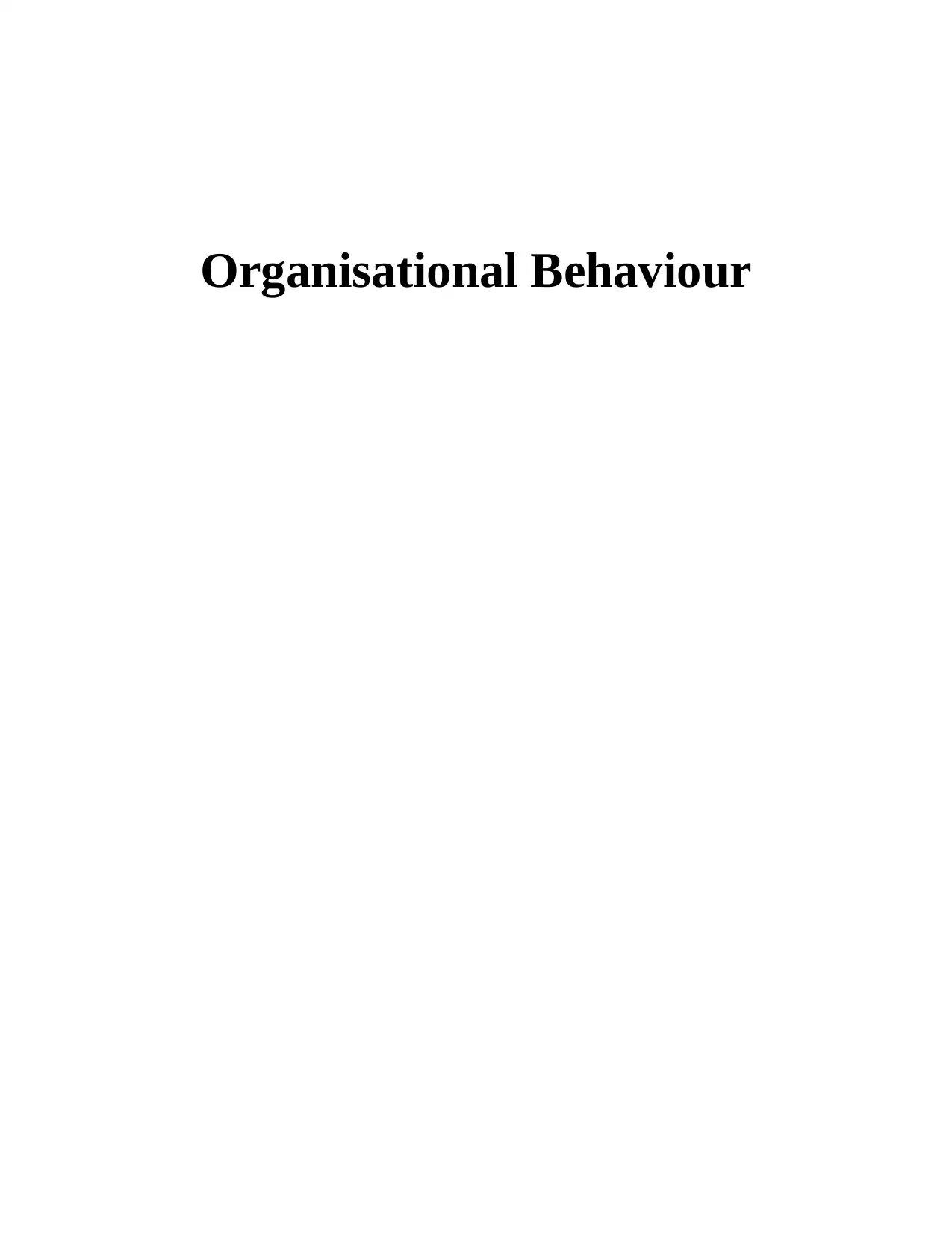
Organisational Behaviour
Paraphrase This Document
Need a fresh take? Get an instant paraphrase of this document with our AI Paraphraser
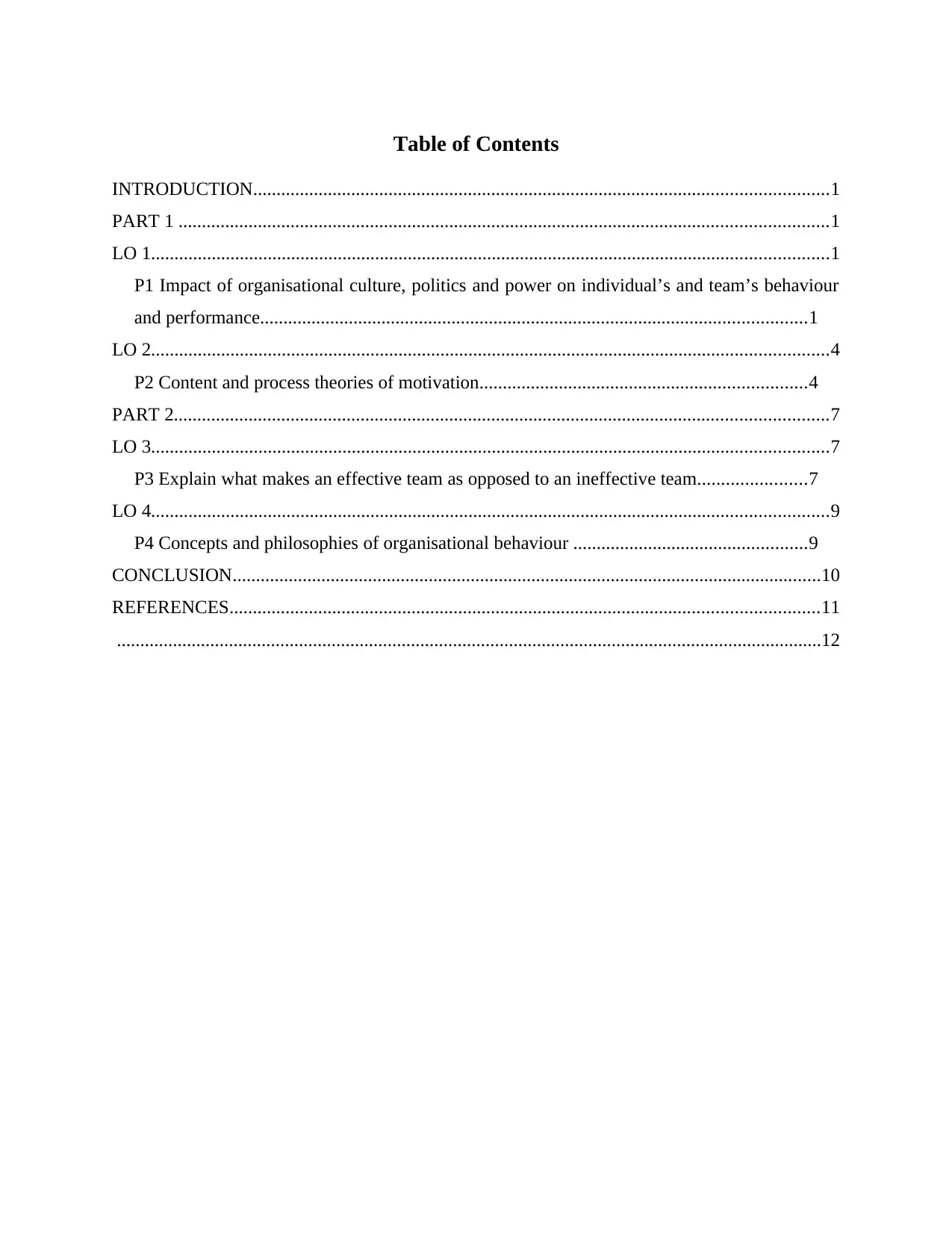
Table of Contents
INTRODUCTION...........................................................................................................................1
PART 1 ...........................................................................................................................................1
LO 1.................................................................................................................................................1
P1 Impact of organisational culture, politics and power on individual’s and team’s behaviour
and performance.....................................................................................................................1
LO 2.................................................................................................................................................4
P2 Content and process theories of motivation......................................................................4
PART 2............................................................................................................................................7
LO 3.................................................................................................................................................7
P3 Explain what makes an effective team as opposed to an ineffective team.......................7
LO 4.................................................................................................................................................9
P4 Concepts and philosophies of organisational behaviour ..................................................9
CONCLUSION..............................................................................................................................10
REFERENCES..............................................................................................................................11
.......................................................................................................................................................12
INTRODUCTION...........................................................................................................................1
PART 1 ...........................................................................................................................................1
LO 1.................................................................................................................................................1
P1 Impact of organisational culture, politics and power on individual’s and team’s behaviour
and performance.....................................................................................................................1
LO 2.................................................................................................................................................4
P2 Content and process theories of motivation......................................................................4
PART 2............................................................................................................................................7
LO 3.................................................................................................................................................7
P3 Explain what makes an effective team as opposed to an ineffective team.......................7
LO 4.................................................................................................................................................9
P4 Concepts and philosophies of organisational behaviour ..................................................9
CONCLUSION..............................................................................................................................10
REFERENCES..............................................................................................................................11
.......................................................................................................................................................12

⊘ This is a preview!⊘
Do you want full access?
Subscribe today to unlock all pages.

Trusted by 1+ million students worldwide
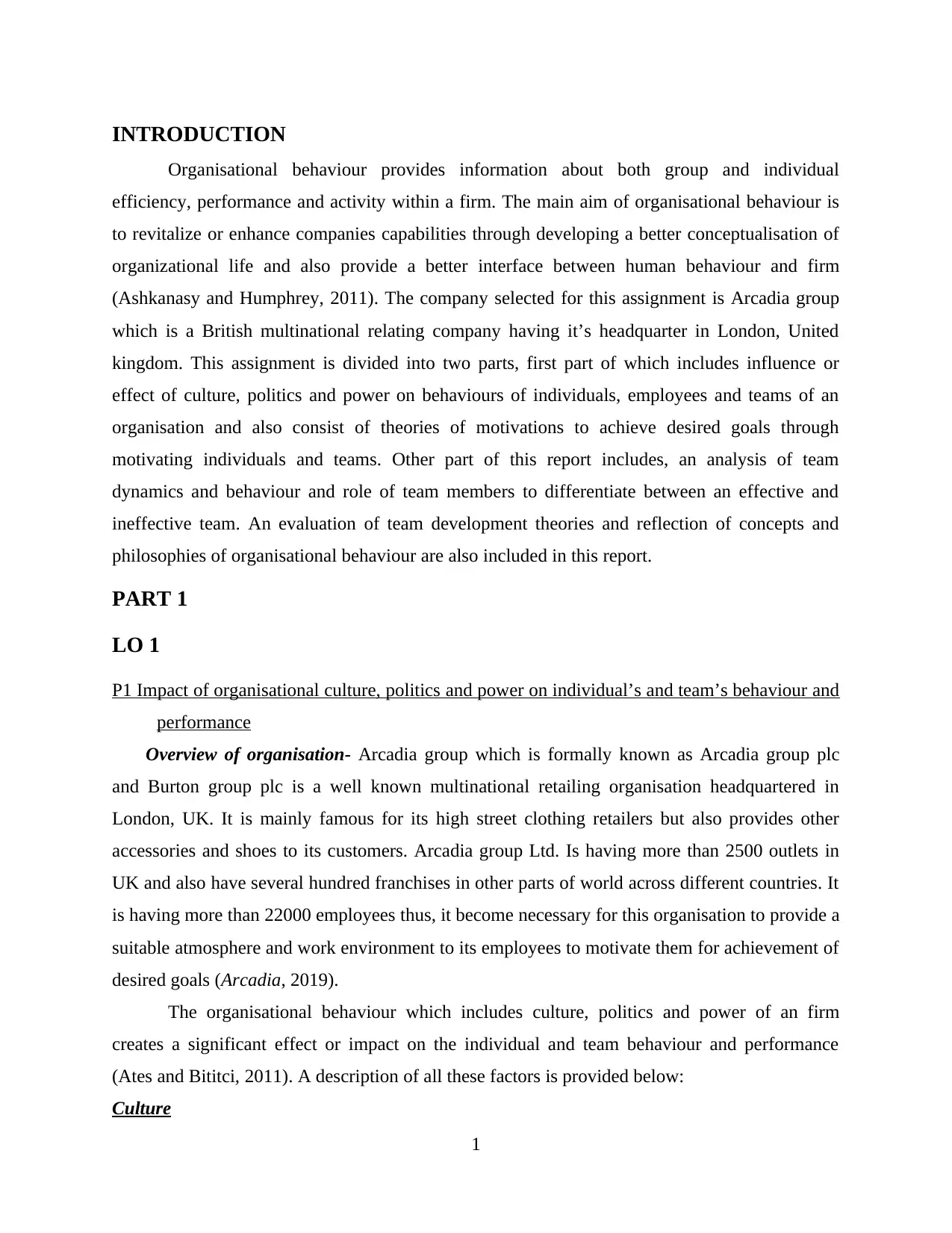
INTRODUCTION
Organisational behaviour provides information about both group and individual
efficiency, performance and activity within a firm. The main aim of organisational behaviour is
to revitalize or enhance companies capabilities through developing a better conceptualisation of
organizational life and also provide a better interface between human behaviour and firm
(Ashkanasy and Humphrey, 2011). The company selected for this assignment is Arcadia group
which is a British multinational relating company having it’s headquarter in London, United
kingdom. This assignment is divided into two parts, first part of which includes influence or
effect of culture, politics and power on behaviours of individuals, employees and teams of an
organisation and also consist of theories of motivations to achieve desired goals through
motivating individuals and teams. Other part of this report includes, an analysis of team
dynamics and behaviour and role of team members to differentiate between an effective and
ineffective team. An evaluation of team development theories and reflection of concepts and
philosophies of organisational behaviour are also included in this report.
PART 1
LO 1
P1 Impact of organisational culture, politics and power on individual’s and team’s behaviour and
performance
Overview of organisation- Arcadia group which is formally known as Arcadia group plc
and Burton group plc is a well known multinational retailing organisation headquartered in
London, UK. It is mainly famous for its high street clothing retailers but also provides other
accessories and shoes to its customers. Arcadia group Ltd. Is having more than 2500 outlets in
UK and also have several hundred franchises in other parts of world across different countries. It
is having more than 22000 employees thus, it become necessary for this organisation to provide a
suitable atmosphere and work environment to its employees to motivate them for achievement of
desired goals (Arcadia, 2019).
The organisational behaviour which includes culture, politics and power of an firm
creates a significant effect or impact on the individual and team behaviour and performance
(Ates and Bititci, 2011). A description of all these factors is provided below:
Culture
1
Organisational behaviour provides information about both group and individual
efficiency, performance and activity within a firm. The main aim of organisational behaviour is
to revitalize or enhance companies capabilities through developing a better conceptualisation of
organizational life and also provide a better interface between human behaviour and firm
(Ashkanasy and Humphrey, 2011). The company selected for this assignment is Arcadia group
which is a British multinational relating company having it’s headquarter in London, United
kingdom. This assignment is divided into two parts, first part of which includes influence or
effect of culture, politics and power on behaviours of individuals, employees and teams of an
organisation and also consist of theories of motivations to achieve desired goals through
motivating individuals and teams. Other part of this report includes, an analysis of team
dynamics and behaviour and role of team members to differentiate between an effective and
ineffective team. An evaluation of team development theories and reflection of concepts and
philosophies of organisational behaviour are also included in this report.
PART 1
LO 1
P1 Impact of organisational culture, politics and power on individual’s and team’s behaviour and
performance
Overview of organisation- Arcadia group which is formally known as Arcadia group plc
and Burton group plc is a well known multinational retailing organisation headquartered in
London, UK. It is mainly famous for its high street clothing retailers but also provides other
accessories and shoes to its customers. Arcadia group Ltd. Is having more than 2500 outlets in
UK and also have several hundred franchises in other parts of world across different countries. It
is having more than 22000 employees thus, it become necessary for this organisation to provide a
suitable atmosphere and work environment to its employees to motivate them for achievement of
desired goals (Arcadia, 2019).
The organisational behaviour which includes culture, politics and power of an firm
creates a significant effect or impact on the individual and team behaviour and performance
(Ates and Bititci, 2011). A description of all these factors is provided below:
Culture
1
Paraphrase This Document
Need a fresh take? Get an instant paraphrase of this document with our AI Paraphraser
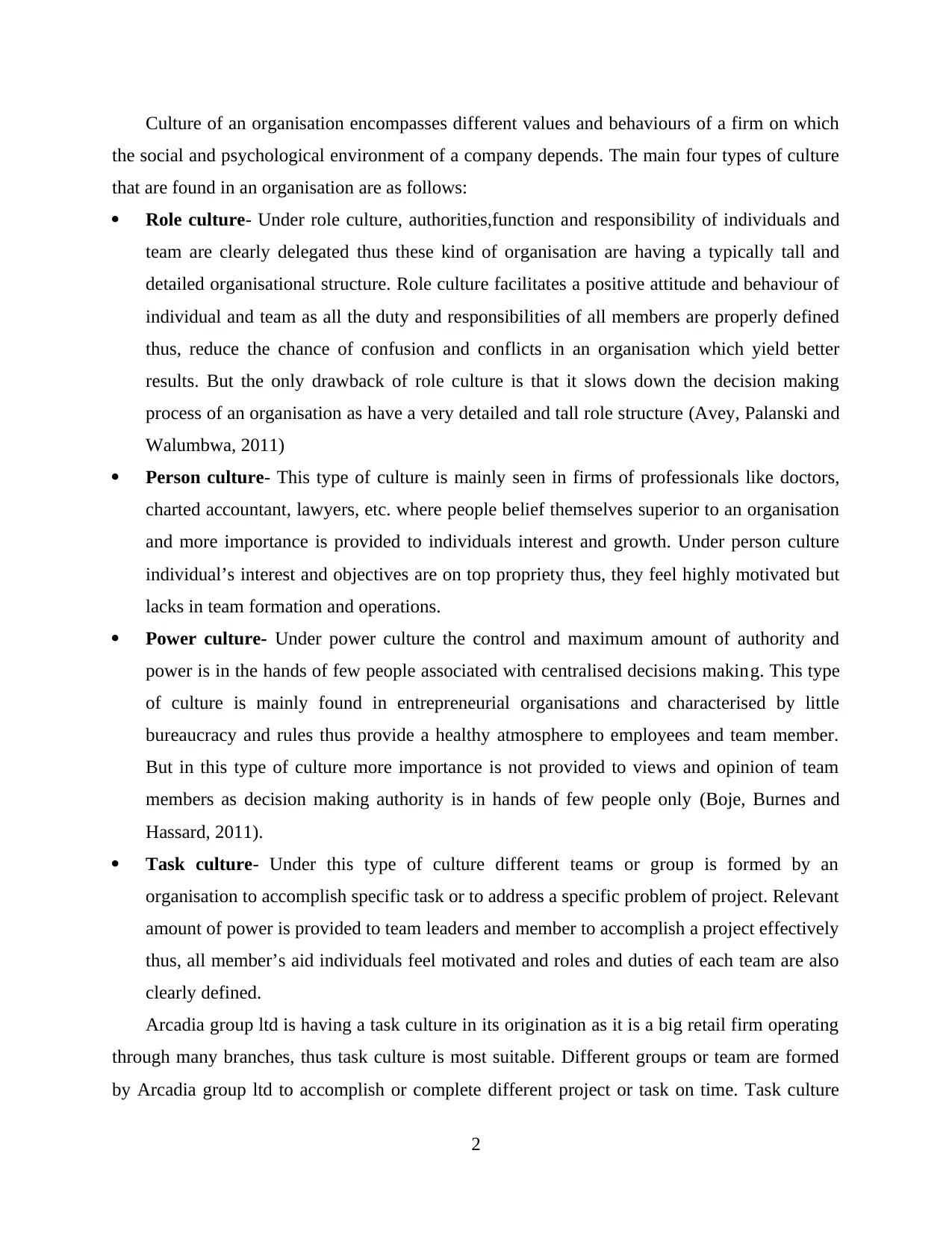
Culture of an organisation encompasses different values and behaviours of a firm on which
the social and psychological environment of a company depends. The main four types of culture
that are found in an organisation are as follows:
Role culture- Under role culture, authorities,function and responsibility of individuals and
team are clearly delegated thus these kind of organisation are having a typically tall and
detailed organisational structure. Role culture facilitates a positive attitude and behaviour of
individual and team as all the duty and responsibilities of all members are properly defined
thus, reduce the chance of confusion and conflicts in an organisation which yield better
results. But the only drawback of role culture is that it slows down the decision making
process of an organisation as have a very detailed and tall role structure (Avey, Palanski and
Walumbwa, 2011)
Person culture- This type of culture is mainly seen in firms of professionals like doctors,
charted accountant, lawyers, etc. where people belief themselves superior to an organisation
and more importance is provided to individuals interest and growth. Under person culture
individual’s interest and objectives are on top propriety thus, they feel highly motivated but
lacks in team formation and operations.
Power culture- Under power culture the control and maximum amount of authority and
power is in the hands of few people associated with centralised decisions making. This type
of culture is mainly found in entrepreneurial organisations and characterised by little
bureaucracy and rules thus provide a healthy atmosphere to employees and team member.
But in this type of culture more importance is not provided to views and opinion of team
members as decision making authority is in hands of few people only (Boje, Burnes and
Hassard, 2011).
Task culture- Under this type of culture different teams or group is formed by an
organisation to accomplish specific task or to address a specific problem of project. Relevant
amount of power is provided to team leaders and member to accomplish a project effectively
thus, all member’s aid individuals feel motivated and roles and duties of each team are also
clearly defined.
Arcadia group ltd is having a task culture in its origination as it is a big retail firm operating
through many branches, thus task culture is most suitable. Different groups or team are formed
by Arcadia group ltd to accomplish or complete different project or task on time. Task culture
2
the social and psychological environment of a company depends. The main four types of culture
that are found in an organisation are as follows:
Role culture- Under role culture, authorities,function and responsibility of individuals and
team are clearly delegated thus these kind of organisation are having a typically tall and
detailed organisational structure. Role culture facilitates a positive attitude and behaviour of
individual and team as all the duty and responsibilities of all members are properly defined
thus, reduce the chance of confusion and conflicts in an organisation which yield better
results. But the only drawback of role culture is that it slows down the decision making
process of an organisation as have a very detailed and tall role structure (Avey, Palanski and
Walumbwa, 2011)
Person culture- This type of culture is mainly seen in firms of professionals like doctors,
charted accountant, lawyers, etc. where people belief themselves superior to an organisation
and more importance is provided to individuals interest and growth. Under person culture
individual’s interest and objectives are on top propriety thus, they feel highly motivated but
lacks in team formation and operations.
Power culture- Under power culture the control and maximum amount of authority and
power is in the hands of few people associated with centralised decisions making. This type
of culture is mainly found in entrepreneurial organisations and characterised by little
bureaucracy and rules thus provide a healthy atmosphere to employees and team member.
But in this type of culture more importance is not provided to views and opinion of team
members as decision making authority is in hands of few people only (Boje, Burnes and
Hassard, 2011).
Task culture- Under this type of culture different teams or group is formed by an
organisation to accomplish specific task or to address a specific problem of project. Relevant
amount of power is provided to team leaders and member to accomplish a project effectively
thus, all member’s aid individuals feel motivated and roles and duties of each team are also
clearly defined.
Arcadia group ltd is having a task culture in its origination as it is a big retail firm operating
through many branches, thus task culture is most suitable. Different groups or team are formed
by Arcadia group ltd to accomplish or complete different project or task on time. Task culture
2
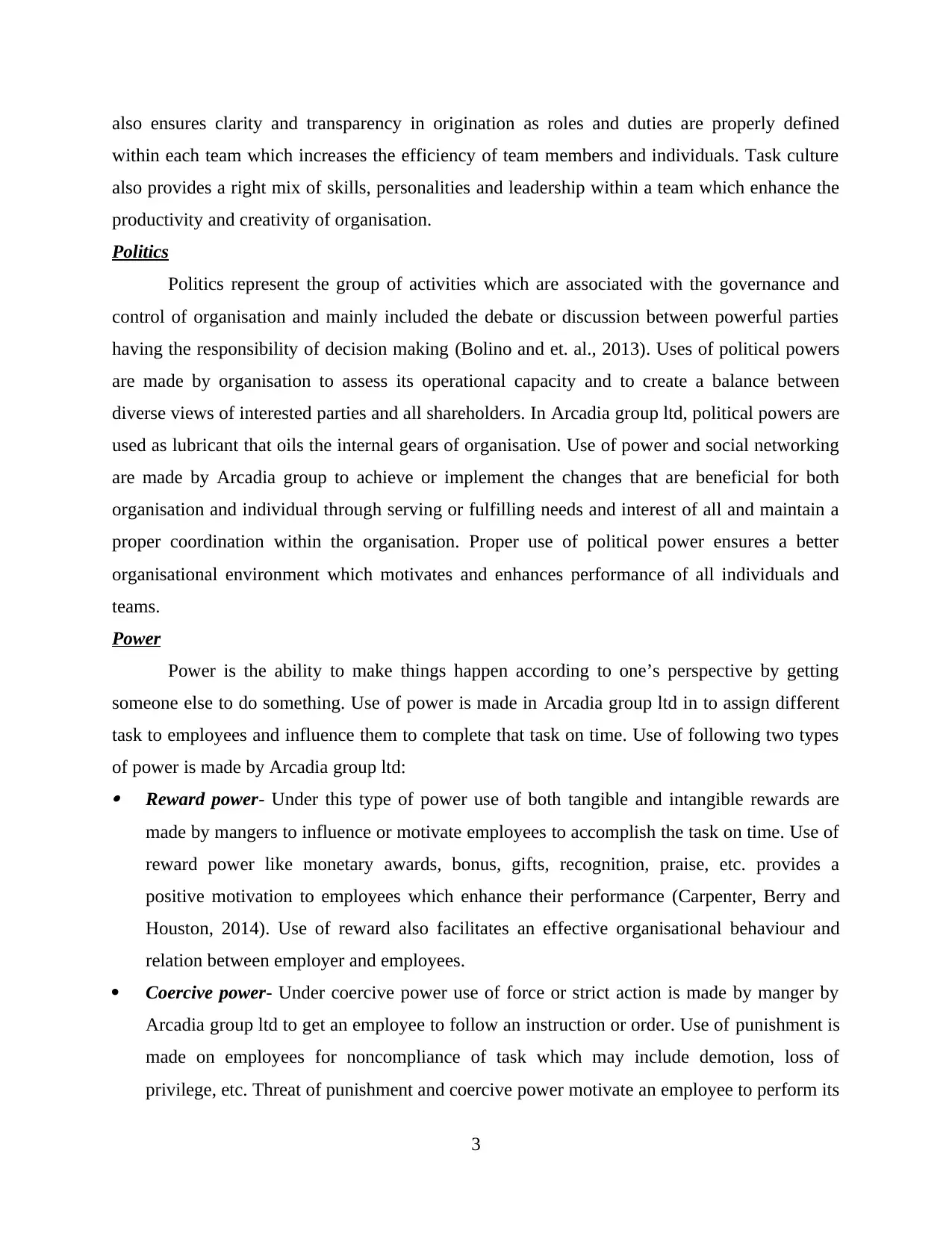
also ensures clarity and transparency in origination as roles and duties are properly defined
within each team which increases the efficiency of team members and individuals. Task culture
also provides a right mix of skills, personalities and leadership within a team which enhance the
productivity and creativity of organisation.
Politics
Politics represent the group of activities which are associated with the governance and
control of organisation and mainly included the debate or discussion between powerful parties
having the responsibility of decision making (Bolino and et. al., 2013). Uses of political powers
are made by organisation to assess its operational capacity and to create a balance between
diverse views of interested parties and all shareholders. In Arcadia group ltd, political powers are
used as lubricant that oils the internal gears of organisation. Use of power and social networking
are made by Arcadia group to achieve or implement the changes that are beneficial for both
organisation and individual through serving or fulfilling needs and interest of all and maintain a
proper coordination within the organisation. Proper use of political power ensures a better
organisational environment which motivates and enhances performance of all individuals and
teams.
Power
Power is the ability to make things happen according to one’s perspective by getting
someone else to do something. Use of power is made in Arcadia group ltd in to assign different
task to employees and influence them to complete that task on time. Use of following two types
of power is made by Arcadia group ltd: Reward power- Under this type of power use of both tangible and intangible rewards are
made by mangers to influence or motivate employees to accomplish the task on time. Use of
reward power like monetary awards, bonus, gifts, recognition, praise, etc. provides a
positive motivation to employees which enhance their performance (Carpenter, Berry and
Houston, 2014). Use of reward also facilitates an effective organisational behaviour and
relation between employer and employees.
Coercive power- Under coercive power use of force or strict action is made by manger by
Arcadia group ltd to get an employee to follow an instruction or order. Use of punishment is
made on employees for noncompliance of task which may include demotion, loss of
privilege, etc. Threat of punishment and coercive power motivate an employee to perform its
3
within each team which increases the efficiency of team members and individuals. Task culture
also provides a right mix of skills, personalities and leadership within a team which enhance the
productivity and creativity of organisation.
Politics
Politics represent the group of activities which are associated with the governance and
control of organisation and mainly included the debate or discussion between powerful parties
having the responsibility of decision making (Bolino and et. al., 2013). Uses of political powers
are made by organisation to assess its operational capacity and to create a balance between
diverse views of interested parties and all shareholders. In Arcadia group ltd, political powers are
used as lubricant that oils the internal gears of organisation. Use of power and social networking
are made by Arcadia group to achieve or implement the changes that are beneficial for both
organisation and individual through serving or fulfilling needs and interest of all and maintain a
proper coordination within the organisation. Proper use of political power ensures a better
organisational environment which motivates and enhances performance of all individuals and
teams.
Power
Power is the ability to make things happen according to one’s perspective by getting
someone else to do something. Use of power is made in Arcadia group ltd in to assign different
task to employees and influence them to complete that task on time. Use of following two types
of power is made by Arcadia group ltd: Reward power- Under this type of power use of both tangible and intangible rewards are
made by mangers to influence or motivate employees to accomplish the task on time. Use of
reward power like monetary awards, bonus, gifts, recognition, praise, etc. provides a
positive motivation to employees which enhance their performance (Carpenter, Berry and
Houston, 2014). Use of reward also facilitates an effective organisational behaviour and
relation between employer and employees.
Coercive power- Under coercive power use of force or strict action is made by manger by
Arcadia group ltd to get an employee to follow an instruction or order. Use of punishment is
made on employees for noncompliance of task which may include demotion, loss of
privilege, etc. Threat of punishment and coercive power motivate an employee to perform its
3
⊘ This is a preview!⊘
Do you want full access?
Subscribe today to unlock all pages.

Trusted by 1+ million students worldwide
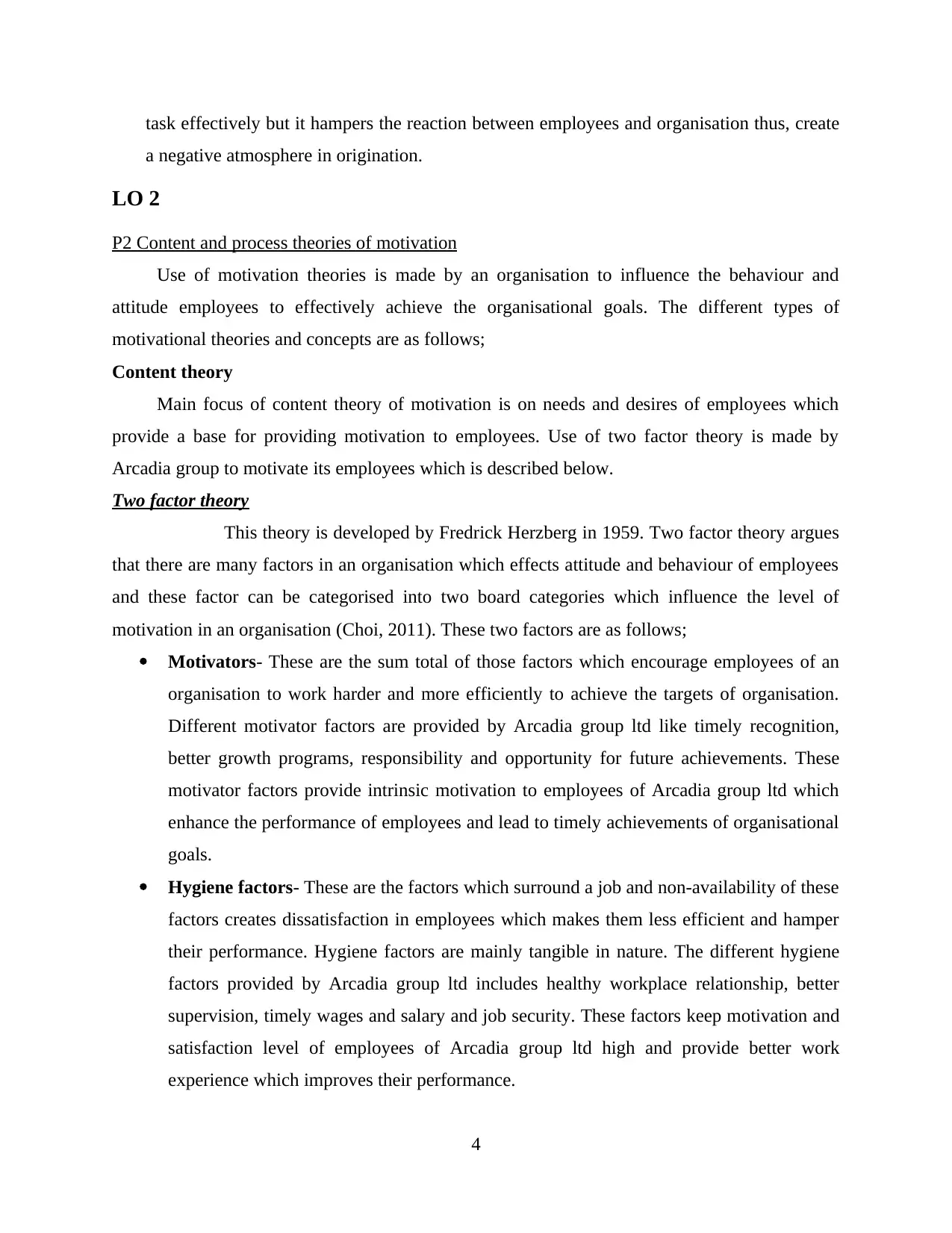
task effectively but it hampers the reaction between employees and organisation thus, create
a negative atmosphere in origination.
LO 2
P2 Content and process theories of motivation
Use of motivation theories is made by an organisation to influence the behaviour and
attitude employees to effectively achieve the organisational goals. The different types of
motivational theories and concepts are as follows;
Content theory
Main focus of content theory of motivation is on needs and desires of employees which
provide a base for providing motivation to employees. Use of two factor theory is made by
Arcadia group to motivate its employees which is described below.
Two factor theory
This theory is developed by Fredrick Herzberg in 1959. Two factor theory argues
that there are many factors in an organisation which effects attitude and behaviour of employees
and these factor can be categorised into two board categories which influence the level of
motivation in an organisation (Choi, 2011). These two factors are as follows;
Motivators- These are the sum total of those factors which encourage employees of an
organisation to work harder and more efficiently to achieve the targets of organisation.
Different motivator factors are provided by Arcadia group ltd like timely recognition,
better growth programs, responsibility and opportunity for future achievements. These
motivator factors provide intrinsic motivation to employees of Arcadia group ltd which
enhance the performance of employees and lead to timely achievements of organisational
goals.
Hygiene factors- These are the factors which surround a job and non-availability of these
factors creates dissatisfaction in employees which makes them less efficient and hamper
their performance. Hygiene factors are mainly tangible in nature. The different hygiene
factors provided by Arcadia group ltd includes healthy workplace relationship, better
supervision, timely wages and salary and job security. These factors keep motivation and
satisfaction level of employees of Arcadia group ltd high and provide better work
experience which improves their performance.
4
a negative atmosphere in origination.
LO 2
P2 Content and process theories of motivation
Use of motivation theories is made by an organisation to influence the behaviour and
attitude employees to effectively achieve the organisational goals. The different types of
motivational theories and concepts are as follows;
Content theory
Main focus of content theory of motivation is on needs and desires of employees which
provide a base for providing motivation to employees. Use of two factor theory is made by
Arcadia group to motivate its employees which is described below.
Two factor theory
This theory is developed by Fredrick Herzberg in 1959. Two factor theory argues
that there are many factors in an organisation which effects attitude and behaviour of employees
and these factor can be categorised into two board categories which influence the level of
motivation in an organisation (Choi, 2011). These two factors are as follows;
Motivators- These are the sum total of those factors which encourage employees of an
organisation to work harder and more efficiently to achieve the targets of organisation.
Different motivator factors are provided by Arcadia group ltd like timely recognition,
better growth programs, responsibility and opportunity for future achievements. These
motivator factors provide intrinsic motivation to employees of Arcadia group ltd which
enhance the performance of employees and lead to timely achievements of organisational
goals.
Hygiene factors- These are the factors which surround a job and non-availability of these
factors creates dissatisfaction in employees which makes them less efficient and hamper
their performance. Hygiene factors are mainly tangible in nature. The different hygiene
factors provided by Arcadia group ltd includes healthy workplace relationship, better
supervision, timely wages and salary and job security. These factors keep motivation and
satisfaction level of employees of Arcadia group ltd high and provide better work
experience which improves their performance.
4
Paraphrase This Document
Need a fresh take? Get an instant paraphrase of this document with our AI Paraphraser
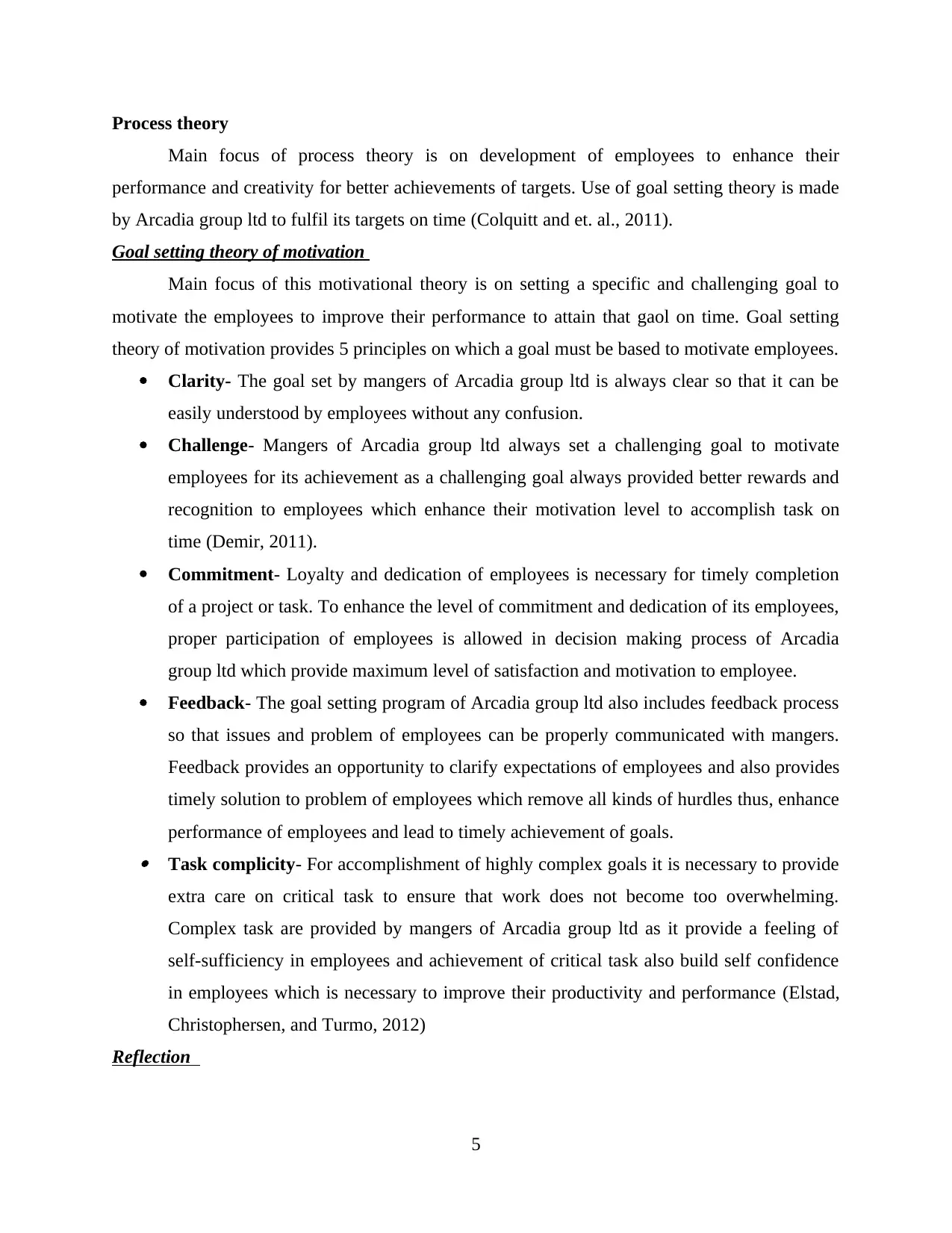
Process theory
Main focus of process theory is on development of employees to enhance their
performance and creativity for better achievements of targets. Use of goal setting theory is made
by Arcadia group ltd to fulfil its targets on time (Colquitt and et. al., 2011).
Goal setting theory of motivation
Main focus of this motivational theory is on setting a specific and challenging goal to
motivate the employees to improve their performance to attain that gaol on time. Goal setting
theory of motivation provides 5 principles on which a goal must be based to motivate employees.
Clarity- The goal set by mangers of Arcadia group ltd is always clear so that it can be
easily understood by employees without any confusion.
Challenge- Mangers of Arcadia group ltd always set a challenging goal to motivate
employees for its achievement as a challenging goal always provided better rewards and
recognition to employees which enhance their motivation level to accomplish task on
time (Demir, 2011).
Commitment- Loyalty and dedication of employees is necessary for timely completion
of a project or task. To enhance the level of commitment and dedication of its employees,
proper participation of employees is allowed in decision making process of Arcadia
group ltd which provide maximum level of satisfaction and motivation to employee.
Feedback- The goal setting program of Arcadia group ltd also includes feedback process
so that issues and problem of employees can be properly communicated with mangers.
Feedback provides an opportunity to clarify expectations of employees and also provides
timely solution to problem of employees which remove all kinds of hurdles thus, enhance
performance of employees and lead to timely achievement of goals. Task complicity- For accomplishment of highly complex goals it is necessary to provide
extra care on critical task to ensure that work does not become too overwhelming.
Complex task are provided by mangers of Arcadia group ltd as it provide a feeling of
self-sufficiency in employees and achievement of critical task also build self confidence
in employees which is necessary to improve their productivity and performance (Elstad,
Christophersen, and Turmo, 2012)
Reflection
5
Main focus of process theory is on development of employees to enhance their
performance and creativity for better achievements of targets. Use of goal setting theory is made
by Arcadia group ltd to fulfil its targets on time (Colquitt and et. al., 2011).
Goal setting theory of motivation
Main focus of this motivational theory is on setting a specific and challenging goal to
motivate the employees to improve their performance to attain that gaol on time. Goal setting
theory of motivation provides 5 principles on which a goal must be based to motivate employees.
Clarity- The goal set by mangers of Arcadia group ltd is always clear so that it can be
easily understood by employees without any confusion.
Challenge- Mangers of Arcadia group ltd always set a challenging goal to motivate
employees for its achievement as a challenging goal always provided better rewards and
recognition to employees which enhance their motivation level to accomplish task on
time (Demir, 2011).
Commitment- Loyalty and dedication of employees is necessary for timely completion
of a project or task. To enhance the level of commitment and dedication of its employees,
proper participation of employees is allowed in decision making process of Arcadia
group ltd which provide maximum level of satisfaction and motivation to employee.
Feedback- The goal setting program of Arcadia group ltd also includes feedback process
so that issues and problem of employees can be properly communicated with mangers.
Feedback provides an opportunity to clarify expectations of employees and also provides
timely solution to problem of employees which remove all kinds of hurdles thus, enhance
performance of employees and lead to timely achievement of goals. Task complicity- For accomplishment of highly complex goals it is necessary to provide
extra care on critical task to ensure that work does not become too overwhelming.
Complex task are provided by mangers of Arcadia group ltd as it provide a feeling of
self-sufficiency in employees and achievement of critical task also build self confidence
in employees which is necessary to improve their productivity and performance (Elstad,
Christophersen, and Turmo, 2012)
Reflection
5
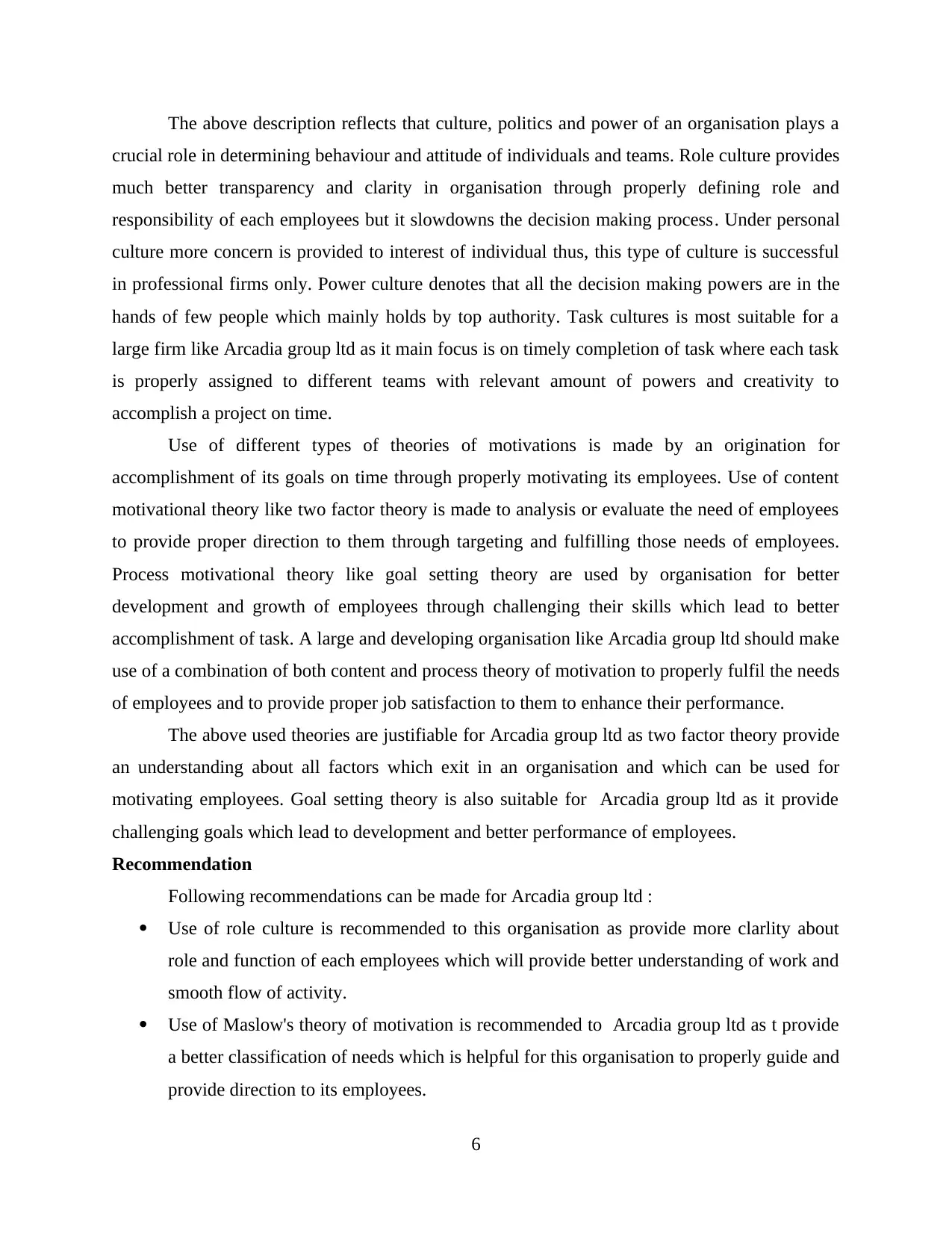
The above description reflects that culture, politics and power of an organisation plays a
crucial role in determining behaviour and attitude of individuals and teams. Role culture provides
much better transparency and clarity in organisation through properly defining role and
responsibility of each employees but it slowdowns the decision making process. Under personal
culture more concern is provided to interest of individual thus, this type of culture is successful
in professional firms only. Power culture denotes that all the decision making powers are in the
hands of few people which mainly holds by top authority. Task cultures is most suitable for a
large firm like Arcadia group ltd as it main focus is on timely completion of task where each task
is properly assigned to different teams with relevant amount of powers and creativity to
accomplish a project on time.
Use of different types of theories of motivations is made by an origination for
accomplishment of its goals on time through properly motivating its employees. Use of content
motivational theory like two factor theory is made to analysis or evaluate the need of employees
to provide proper direction to them through targeting and fulfilling those needs of employees.
Process motivational theory like goal setting theory are used by organisation for better
development and growth of employees through challenging their skills which lead to better
accomplishment of task. A large and developing organisation like Arcadia group ltd should make
use of a combination of both content and process theory of motivation to properly fulfil the needs
of employees and to provide proper job satisfaction to them to enhance their performance.
The above used theories are justifiable for Arcadia group ltd as two factor theory provide
an understanding about all factors which exit in an organisation and which can be used for
motivating employees. Goal setting theory is also suitable for Arcadia group ltd as it provide
challenging goals which lead to development and better performance of employees.
Recommendation
Following recommendations can be made for Arcadia group ltd :
Use of role culture is recommended to this organisation as provide more clarlity about
role and function of each employees which will provide better understanding of work and
smooth flow of activity.
Use of Maslow's theory of motivation is recommended to Arcadia group ltd as t provide
a better classification of needs which is helpful for this organisation to properly guide and
provide direction to its employees.
6
crucial role in determining behaviour and attitude of individuals and teams. Role culture provides
much better transparency and clarity in organisation through properly defining role and
responsibility of each employees but it slowdowns the decision making process. Under personal
culture more concern is provided to interest of individual thus, this type of culture is successful
in professional firms only. Power culture denotes that all the decision making powers are in the
hands of few people which mainly holds by top authority. Task cultures is most suitable for a
large firm like Arcadia group ltd as it main focus is on timely completion of task where each task
is properly assigned to different teams with relevant amount of powers and creativity to
accomplish a project on time.
Use of different types of theories of motivations is made by an origination for
accomplishment of its goals on time through properly motivating its employees. Use of content
motivational theory like two factor theory is made to analysis or evaluate the need of employees
to provide proper direction to them through targeting and fulfilling those needs of employees.
Process motivational theory like goal setting theory are used by organisation for better
development and growth of employees through challenging their skills which lead to better
accomplishment of task. A large and developing organisation like Arcadia group ltd should make
use of a combination of both content and process theory of motivation to properly fulfil the needs
of employees and to provide proper job satisfaction to them to enhance their performance.
The above used theories are justifiable for Arcadia group ltd as two factor theory provide
an understanding about all factors which exit in an organisation and which can be used for
motivating employees. Goal setting theory is also suitable for Arcadia group ltd as it provide
challenging goals which lead to development and better performance of employees.
Recommendation
Following recommendations can be made for Arcadia group ltd :
Use of role culture is recommended to this organisation as provide more clarlity about
role and function of each employees which will provide better understanding of work and
smooth flow of activity.
Use of Maslow's theory of motivation is recommended to Arcadia group ltd as t provide
a better classification of needs which is helpful for this organisation to properly guide and
provide direction to its employees.
6
⊘ This is a preview!⊘
Do you want full access?
Subscribe today to unlock all pages.

Trusted by 1+ million students worldwide
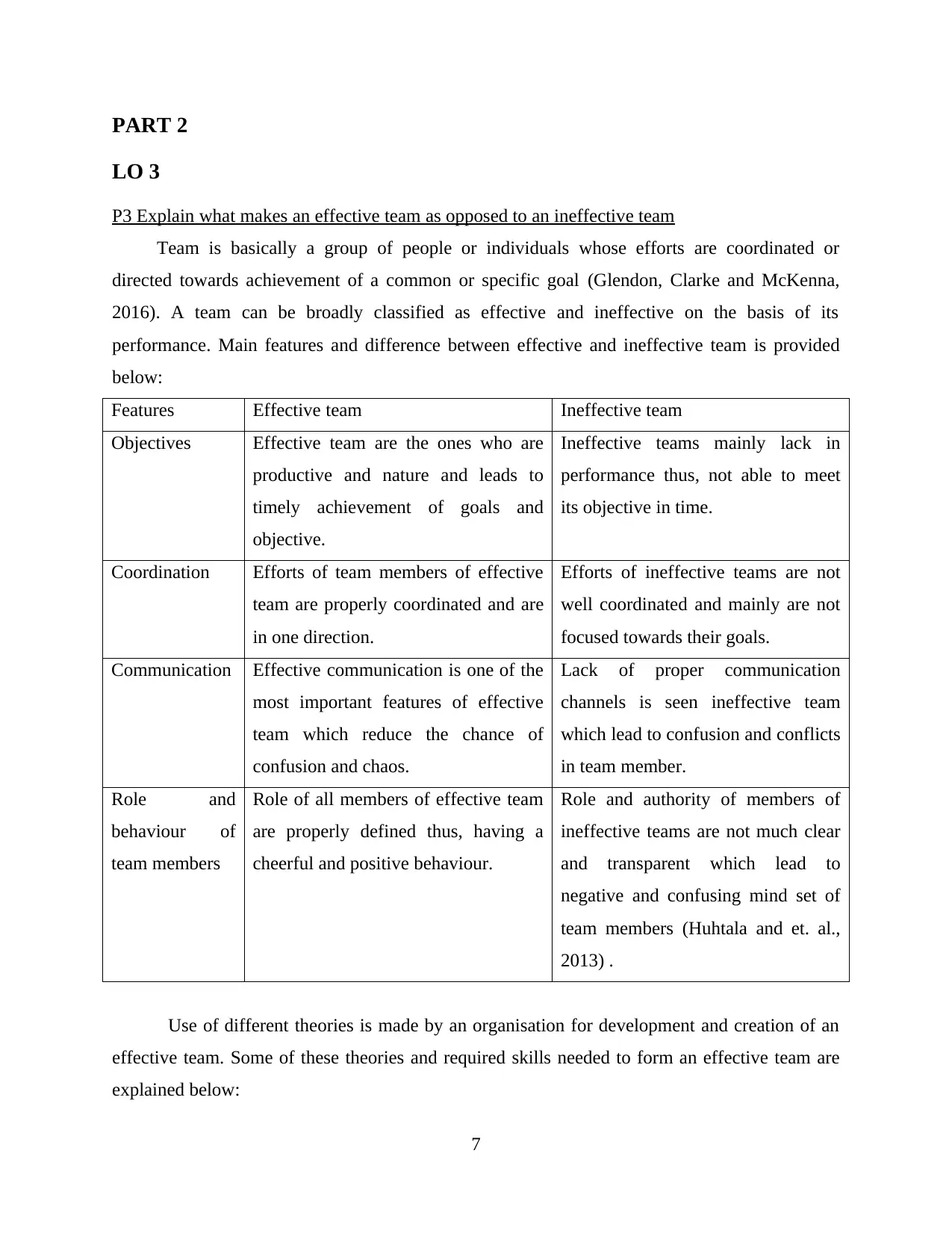
PART 2
LO 3
P3 Explain what makes an effective team as opposed to an ineffective team
Team is basically a group of people or individuals whose efforts are coordinated or
directed towards achievement of a common or specific goal (Glendon, Clarke and McKenna,
2016). A team can be broadly classified as effective and ineffective on the basis of its
performance. Main features and difference between effective and ineffective team is provided
below:
Features Effective team Ineffective team
Objectives Effective team are the ones who are
productive and nature and leads to
timely achievement of goals and
objective.
Ineffective teams mainly lack in
performance thus, not able to meet
its objective in time.
Coordination Efforts of team members of effective
team are properly coordinated and are
in one direction.
Efforts of ineffective teams are not
well coordinated and mainly are not
focused towards their goals.
Communication Effective communication is one of the
most important features of effective
team which reduce the chance of
confusion and chaos.
Lack of proper communication
channels is seen ineffective team
which lead to confusion and conflicts
in team member.
Role and
behaviour of
team members
Role of all members of effective team
are properly defined thus, having a
cheerful and positive behaviour.
Role and authority of members of
ineffective teams are not much clear
and transparent which lead to
negative and confusing mind set of
team members (Huhtala and et. al.,
2013) .
Use of different theories is made by an organisation for development and creation of an
effective team. Some of these theories and required skills needed to form an effective team are
explained below:
7
LO 3
P3 Explain what makes an effective team as opposed to an ineffective team
Team is basically a group of people or individuals whose efforts are coordinated or
directed towards achievement of a common or specific goal (Glendon, Clarke and McKenna,
2016). A team can be broadly classified as effective and ineffective on the basis of its
performance. Main features and difference between effective and ineffective team is provided
below:
Features Effective team Ineffective team
Objectives Effective team are the ones who are
productive and nature and leads to
timely achievement of goals and
objective.
Ineffective teams mainly lack in
performance thus, not able to meet
its objective in time.
Coordination Efforts of team members of effective
team are properly coordinated and are
in one direction.
Efforts of ineffective teams are not
well coordinated and mainly are not
focused towards their goals.
Communication Effective communication is one of the
most important features of effective
team which reduce the chance of
confusion and chaos.
Lack of proper communication
channels is seen ineffective team
which lead to confusion and conflicts
in team member.
Role and
behaviour of
team members
Role of all members of effective team
are properly defined thus, having a
cheerful and positive behaviour.
Role and authority of members of
ineffective teams are not much clear
and transparent which lead to
negative and confusing mind set of
team members (Huhtala and et. al.,
2013) .
Use of different theories is made by an organisation for development and creation of an
effective team. Some of these theories and required skills needed to form an effective team are
explained below:
7
Paraphrase This Document
Need a fresh take? Get an instant paraphrase of this document with our AI Paraphraser
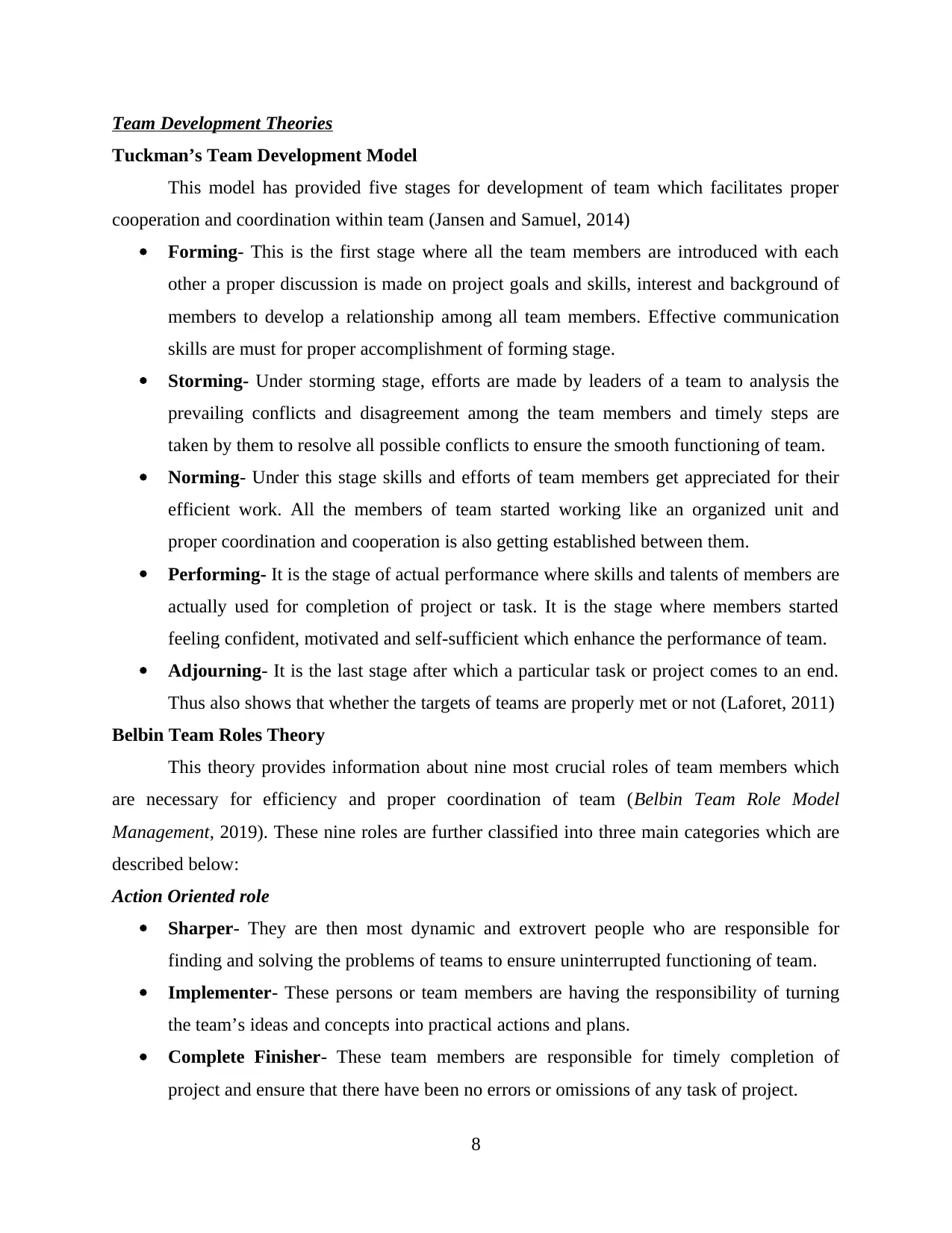
Team Development Theories
Tuckman’s Team Development Model
This model has provided five stages for development of team which facilitates proper
cooperation and coordination within team (Jansen and Samuel, 2014)
Forming- This is the first stage where all the team members are introduced with each
other a proper discussion is made on project goals and skills, interest and background of
members to develop a relationship among all team members. Effective communication
skills are must for proper accomplishment of forming stage.
Storming- Under storming stage, efforts are made by leaders of a team to analysis the
prevailing conflicts and disagreement among the team members and timely steps are
taken by them to resolve all possible conflicts to ensure the smooth functioning of team.
Norming- Under this stage skills and efforts of team members get appreciated for their
efficient work. All the members of team started working like an organized unit and
proper coordination and cooperation is also getting established between them.
Performing- It is the stage of actual performance where skills and talents of members are
actually used for completion of project or task. It is the stage where members started
feeling confident, motivated and self-sufficient which enhance the performance of team.
Adjourning- It is the last stage after which a particular task or project comes to an end.
Thus also shows that whether the targets of teams are properly met or not (Laforet, 2011)
Belbin Team Roles Theory
This theory provides information about nine most crucial roles of team members which
are necessary for efficiency and proper coordination of team (Belbin Team Role Model
Management, 2019). These nine roles are further classified into three main categories which are
described below:
Action Oriented role
Sharper- They are then most dynamic and extrovert people who are responsible for
finding and solving the problems of teams to ensure uninterrupted functioning of team.
Implementer- These persons or team members are having the responsibility of turning
the team’s ideas and concepts into practical actions and plans.
Complete Finisher- These team members are responsible for timely completion of
project and ensure that there have been no errors or omissions of any task of project.
8
Tuckman’s Team Development Model
This model has provided five stages for development of team which facilitates proper
cooperation and coordination within team (Jansen and Samuel, 2014)
Forming- This is the first stage where all the team members are introduced with each
other a proper discussion is made on project goals and skills, interest and background of
members to develop a relationship among all team members. Effective communication
skills are must for proper accomplishment of forming stage.
Storming- Under storming stage, efforts are made by leaders of a team to analysis the
prevailing conflicts and disagreement among the team members and timely steps are
taken by them to resolve all possible conflicts to ensure the smooth functioning of team.
Norming- Under this stage skills and efforts of team members get appreciated for their
efficient work. All the members of team started working like an organized unit and
proper coordination and cooperation is also getting established between them.
Performing- It is the stage of actual performance where skills and talents of members are
actually used for completion of project or task. It is the stage where members started
feeling confident, motivated and self-sufficient which enhance the performance of team.
Adjourning- It is the last stage after which a particular task or project comes to an end.
Thus also shows that whether the targets of teams are properly met or not (Laforet, 2011)
Belbin Team Roles Theory
This theory provides information about nine most crucial roles of team members which
are necessary for efficiency and proper coordination of team (Belbin Team Role Model
Management, 2019). These nine roles are further classified into three main categories which are
described below:
Action Oriented role
Sharper- They are then most dynamic and extrovert people who are responsible for
finding and solving the problems of teams to ensure uninterrupted functioning of team.
Implementer- These persons or team members are having the responsibility of turning
the team’s ideas and concepts into practical actions and plans.
Complete Finisher- These team members are responsible for timely completion of
project and ensure that there have been no errors or omissions of any task of project.
8
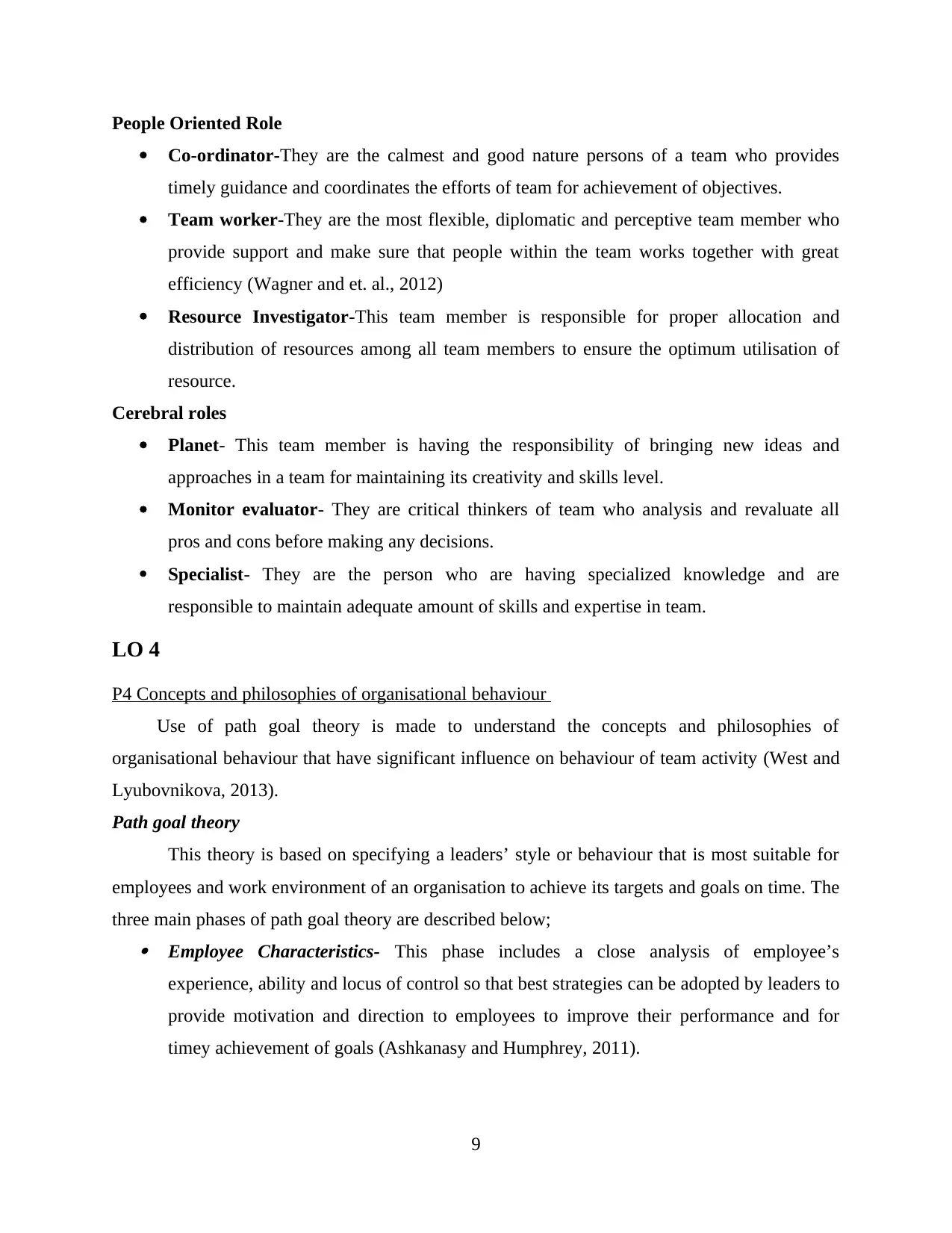
People Oriented Role
Co-ordinator-They are the calmest and good nature persons of a team who provides
timely guidance and coordinates the efforts of team for achievement of objectives.
Team worker-They are the most flexible, diplomatic and perceptive team member who
provide support and make sure that people within the team works together with great
efficiency (Wagner and et. al., 2012)
Resource Investigator-This team member is responsible for proper allocation and
distribution of resources among all team members to ensure the optimum utilisation of
resource.
Cerebral roles
Planet- This team member is having the responsibility of bringing new ideas and
approaches in a team for maintaining its creativity and skills level.
Monitor evaluator- They are critical thinkers of team who analysis and revaluate all
pros and cons before making any decisions.
Specialist- They are the person who are having specialized knowledge and are
responsible to maintain adequate amount of skills and expertise in team.
LO 4
P4 Concepts and philosophies of organisational behaviour
Use of path goal theory is made to understand the concepts and philosophies of
organisational behaviour that have significant influence on behaviour of team activity (West and
Lyubovnikova, 2013).
Path goal theory
This theory is based on specifying a leaders’ style or behaviour that is most suitable for
employees and work environment of an organisation to achieve its targets and goals on time. The
three main phases of path goal theory are described below; Employee Characteristics- This phase includes a close analysis of employee’s
experience, ability and locus of control so that best strategies can be adopted by leaders to
provide motivation and direction to employees to improve their performance and for
timey achievement of goals (Ashkanasy and Humphrey, 2011).
9
Co-ordinator-They are the calmest and good nature persons of a team who provides
timely guidance and coordinates the efforts of team for achievement of objectives.
Team worker-They are the most flexible, diplomatic and perceptive team member who
provide support and make sure that people within the team works together with great
efficiency (Wagner and et. al., 2012)
Resource Investigator-This team member is responsible for proper allocation and
distribution of resources among all team members to ensure the optimum utilisation of
resource.
Cerebral roles
Planet- This team member is having the responsibility of bringing new ideas and
approaches in a team for maintaining its creativity and skills level.
Monitor evaluator- They are critical thinkers of team who analysis and revaluate all
pros and cons before making any decisions.
Specialist- They are the person who are having specialized knowledge and are
responsible to maintain adequate amount of skills and expertise in team.
LO 4
P4 Concepts and philosophies of organisational behaviour
Use of path goal theory is made to understand the concepts and philosophies of
organisational behaviour that have significant influence on behaviour of team activity (West and
Lyubovnikova, 2013).
Path goal theory
This theory is based on specifying a leaders’ style or behaviour that is most suitable for
employees and work environment of an organisation to achieve its targets and goals on time. The
three main phases of path goal theory are described below; Employee Characteristics- This phase includes a close analysis of employee’s
experience, ability and locus of control so that best strategies can be adopted by leaders to
provide motivation and direction to employees to improve their performance and for
timey achievement of goals (Ashkanasy and Humphrey, 2011).
9
⊘ This is a preview!⊘
Do you want full access?
Subscribe today to unlock all pages.

Trusted by 1+ million students worldwide
1 out of 15
Related Documents
Your All-in-One AI-Powered Toolkit for Academic Success.
+13062052269
info@desklib.com
Available 24*7 on WhatsApp / Email
![[object Object]](/_next/static/media/star-bottom.7253800d.svg)
Unlock your academic potential
Copyright © 2020–2026 A2Z Services. All Rights Reserved. Developed and managed by ZUCOL.





